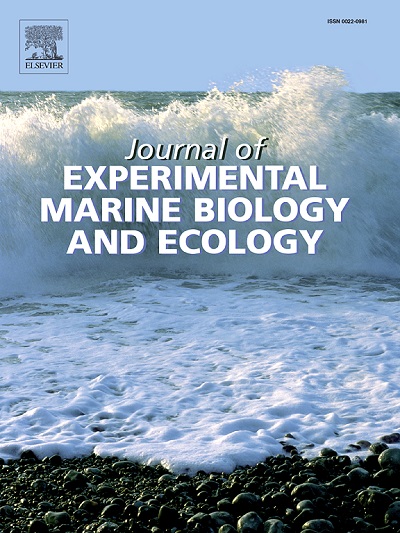Organic enrichment negatively impacts meiobenthic copepods on Argentinean coasts
IF 1.8
3区 生物学
Q3 ECOLOGY
Journal of Experimental Marine Biology and Ecology
Pub Date : 2025-06-30
DOI:10.1016/j.jembe.2025.152118
引用次数: 0
Abstract
Organic enrichment is a growing threat to coastal environments, yet its effects on meiobenthic copepods in marine sediments remain poorly understood. In this large-scale observational study conducted in Buenos Aires Province, Argentina, we evaluated the impact of riverine input—particularly the organic matter transported by rivers—on the structure of meiobenthic copepod communities. We hypothesized that the amount of organic matter and other abiotic factors, influenced by river discharge, modify environmental conditions and affect copepod abundance and richness. Sampling was conducted in low intertidal zones associated with the mouth of eight rivers on three dates between 2019 and 2020. At each site, we collected samples at three coastal positions—river mouth, 200 m west, and 200 m east—to assess copepod richness and abundance, organic matter content, temperature, pH, salinity, and grain size. Our findings indicate that riverine input played a key role in shaping copepod community structure, with temperature emerging as the primary environmental driver of community composition. Organic matter content and salinity were also critical abiotic variables influencing abundance and richness. Salinity modulated the effect of organic matter, with negative impacts on abundance becoming more pronounced under high-salinity conditions. These patterns support the hypothesis that organic enrichment negatively impacts meiobenthic copepod communities, as even slight increases in organic matter content were linked to decreases in both abundance and richness.
有机富集对阿根廷海岸低底生桡足类有负面影响
有机富集对沿海环境的威胁日益严重,但其对海洋沉积物中小底生桡足类动物的影响尚不清楚。在阿根廷布宜诺斯艾利斯省进行的这项大规模观察研究中,我们评估了河流输入,特别是河流输送的有机物对中新世桡足动物群落结构的影响。我们推测,受河流流量的影响,有机质和其他非生物因子改变了环境条件,影响了桡足动物的丰度和丰富度。在2019年至2020年的三个日期,在与8条河流入海口相关的低潮间带进行了采样。在每个地点,我们分别在河口、西侧200米和东侧200米三个沿海位置采集样本,以评估桡足动物的丰富度和丰度、有机质含量、温度、pH、盐度和粒度。研究结果表明,河流输入在桡足动物群落结构的形成中起着关键作用,温度成为群落组成的主要环境驱动因素。有机质含量和盐度也是影响丰度和丰富度的关键非生物变量。盐度调节有机质的作用,在高盐度条件下对丰度的负面影响更为明显。这些模式支持了有机富集对低底生桡足动物群落产生负面影响的假设,因为即使有机质含量的轻微增加也与丰度和丰富度的降低有关。
本文章由计算机程序翻译,如有差异,请以英文原文为准。
求助全文
约1分钟内获得全文
求助全文
来源期刊
CiteScore
4.30
自引率
0.00%
发文量
98
审稿时长
14 weeks
期刊介绍:
The Journal of Experimental Marine Biology and Ecology provides a forum for experimental ecological research on marine organisms in relation to their environment. Topic areas include studies that focus on biochemistry, physiology, behavior, genetics, and ecological theory. The main emphasis of the Journal lies in hypothesis driven experimental work, both from the laboratory and the field. Natural experiments or descriptive studies that elucidate fundamental ecological processes are welcome. Submissions should have a broad ecological framework beyond the specific study organism or geographic region.
Short communications that highlight emerging issues and exciting discoveries within five printed pages will receive a rapid turnaround. Papers describing important new analytical, computational, experimental and theoretical techniques and methods are encouraged and will be highlighted as Methodological Advances. We welcome proposals for Review Papers synthesizing a specific field within marine ecology. Finally, the journal aims to publish Special Issues at regular intervals synthesizing a particular field of marine science. All printed papers undergo a peer review process before being accepted and will receive a first decision within three months.

 求助内容:
求助内容: 应助结果提醒方式:
应助结果提醒方式:


